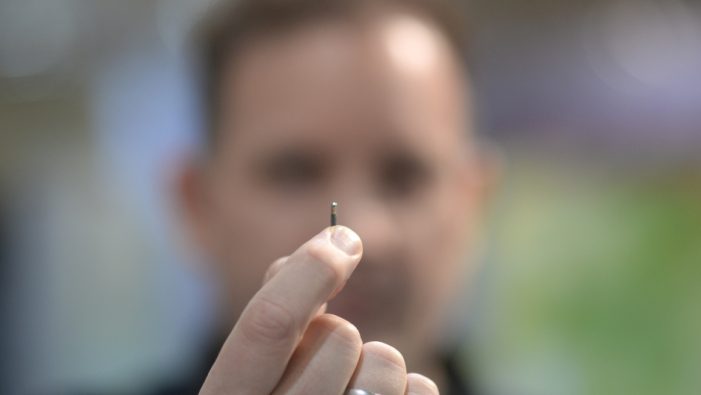
“Imagine showing your COVID-19 passport with just a flash of your arm” captions a December 2021 video about a Swedish company that has developed a microchip inserted under a person’s skin in order to verify vaccine status.1 The microchip, developed by Swedish startup company Epicenter of Stockholm is approximately the size of a grain of rice and is being touted as way to help facilitate more efficient vaccine status verification and also store easily retrievable personal medical information.
According to the company’s Chief Disruption Officer Hannes Sjoblad, it can be used to store data such as passports and medical records and can also be used as a key fob or to hold personal identification. Sjoblad states:
The human body is the next big platform. We are updating our bodies with technology on a large scale already with wearables. But all of the wearables we wear today will be implantable in our bodies in five to 10 years.1
The British newspaper The Independent reports that following Sweden’s new laws requiring vaccine passports at events with more than 100 people, approximately 6,000 individuals had the microchips inserted into their hands.2
Vaccine Data Implanted in Human Body Read by Same Technology as Contactless Payments
The chip is implanted using a syringe and can be activated by a reader held near the device. Data then flows between the chip and device via electromagnetic waves, the same technology used to take contactless payments.3 The use of contactless payment options surged and became a “new normal” amidst concerns of SARS-CoV-2 virus disease transmission. A Mastercard study found that 79 percent of survey respondents had transitioned to contactless payments. The value of contactless payment volumes went from $1.05 trillion in 2019 to an estimated $4.6 trillion by 2027.4
Microchip technology embedded under the skin isn’t a vaccine-sparked concept. In 2017, a Wisconsin-based tech company offered free microchip implants to employees to unlock rooms and buy food and drinks in the break room. Sjoblad held “transplant parties” in 2014 during which employees would “gather in a fun, social setting”1 to get the microchips embedded, a process which he says is completely reversible.
Quantum Dot Tattoos on Skin in Development to Verify Vaccine Status
A similar concept to verify vaccination records known as “quantum dot tattoos” on skin was in development well before the SARS-CoV-2 virus and COVID-19 became household words.5 The two-year quantum dot tattoo research project, which was published in December 2019,6 was requested and funded by the Bill and Melinda Gates Foundation. Researchers at Rice University developed the skin tattoos which “fluoresce with information about a person’s vaccination status.”5
The tattoo is not made of ink but a copper-based “biocompatible nanocrystal,” which can then be scanned by a smartphone. According to Kevin McHugh, PhD, Assistant Professor of Bioengineering at Rice University, the tattoo technology was developed at the request of the Gates Foundation to better track vaccination status in remote areas of the world where there is a lack of standardized immunization recordkeeping.
“This technology could enable the rapid and anonymous detection of patient vaccination history to ensure that every child is vaccinated,” Dr. McHugh said.7
If you would like to receive an e-mail notice of the most recent articles published in The Vaccine Reaction each week, click here.
Click here to view References:
No comments:
Post a Comment